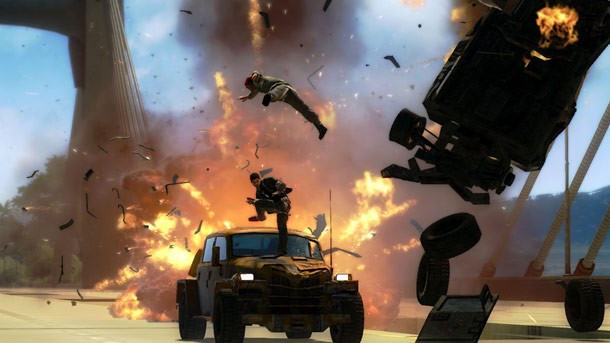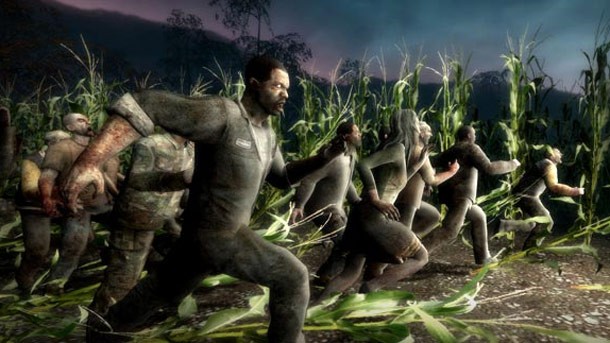Video Game Stress Relievers

As the complexity of video games has increased over the years, so have the challenges they provide to players. How do developers make a game that pushes a player's skills to their limits without causing undue frustration? We outline some of the common annoyances games suffer from and the methods developers use to prevent you from ripping your hair out.

The Waiting Game:
One of the biggest factors that determines how much frustration a
game may cause is the length of time players must wait to restart after dying. There's
nothing worse than having to wait through a long load time for the game to
reset the challenge that just killed you off. The survival horror genre is
particularly susceptible to this problem - in some games like Saw II you'll occasionally
spend more time waiting for the game to reload than you will playing through
the booby trap that keeps killing you.
It's not just load times that can cause a meltdown. Lengthy death animations, screen fades, and even the delay between dying and when a retry option pops up on screen can compound the frustration. These aspects may seem trivial, but if you are dying repeatedly due to unclear goals or a spike in difficulty, any pause in getting back into the game can be irritating. Super Meat Boy brilliantly avoids this problem by featuring instant respawns. As a result you can die dozens of times without feeling like you want to die in real life.
Finally, sometimes waiting comes down to gameplay itself. Time-based challenges can be particularly tricky, as can races, and challenges that span multiple rounds, such has Gears of Wars' oft-copied Horde mode. All of these mission types can transform gameplay into a chore if you have to replay them several times to win, or if the early rounds feel perfunctory.

Checkpoint Reached:
The advent of the checkpoint might just be the most important innovation
that developers have made to relieve the frustration caused by player death. Checkpoint
systems have all but eliminated the industry standard of counting player lives
and the necessity for replaying entire levels. But simply having checkpoints in
a game isn't enough. Spacing is a major issue; developers oftentimes
underestimate the need for checkpoints, placing them too far apart, or neglecting
to save the player's progress before a major fight. Only having to replay
15 minutes instead of 30 is of little consolation when you're
struggling with a game's difficulty level.
Another issue is the player state at the time of the checkpoint. If the game saves when you have just a sliver of health (or if you're in the middle of a deadly fall), you may be painted into an inescapable corner. Some games solve this problem by either resetting your state at a checkpoint, or by incrementally giving you more health or ammo each time you die.
Checkpoints are certainly helpful, but they can't beat the freedom of a save anywhere system. A save anywhere system ensures that the player will never have to walk into a situation unprepared, and absolves the developers of blame - if you have to replay a lengthy or annoying part of the game, it's nobody's fault but your own. Save anywhere systems do create their own set of problems: they pull a player out of the game by making them constantly save and manage an ever-growing list of checkpoints, and they can drastically cut down on the suspense. But they serve a more practical purpose than just managing difficulty: they can save you from game breaking bugs, which are more prevalent than ever before. The old adage "save early, save often," isn't just for reaching retirement anymore.

Content Tourist:
Everyone's definition of what constitutes as "easy" differs, and
nothing is more annoying than when a developer's "easy" still translates to
countless deaths. There are a few common methods to adjusting difficulty levels.
The most frequent approach is to reduce the amount of damage it takes to kill
enemies while increasing the health of the player, but some games will actually
alter their level design to accommodate more fickle gamers; Mega Man 10, for
example, adds additional platforms to aid players through some of the game's trickier
jumps. Aiming assists - seen in virtually every modern first-person shooter -
are also often utilized more heavily in easier modes.
The biggest shift in the industry's use of easy modes over the past few years is in the purpose that they serve. More and more developers now choose to focus on the experiences and stories that video games can provide, rather than the pure challenge of the gameplay. A new difficulty level has been created for casual gamers or "content tourists" - gamers who want to focus solely on the set pieces as having fun. As such many easy difficulty levels now virtually guarantee every type of player can reach the end credits. Some gamers will cry foul at this lack of challenge, but sometimes a lower difficulty setting can open up new avenues of gameplay: Playing on easy mode in games like Red Faction: Guerrilla or Just Cause 2 allows you to focus on coming up with creative ways to blow things up, instead of running for cover every five seconds. Whatever setting you choose to play on, the most important aspect of difficulty levels is the ability to change it during the game.

The Death Penalty:
Dying has always been one of the more aggravating aspects of video
games, but it, too, has been revised over the years. Perhaps gamers are just
getting better, but compared to the days of 2D platformers and shoot-em-ups, it
now seems easier to get through games without dying (or at least negate deaths
through reloading save states).
One gameplay tweak that helps keep players alive is regenerating health, which has become an industry standard in most games. The ability to regain your health after a few seconds means you're no longer penalized for taking damage (or more importantly, for trying a failed tactic), and removes the need to scour your environment for health packs.
When a player does actually die, the penalty is rarely a game over screen anymore. Instead, developers have come up with other ways to punish gamers. The GTA series respawns players at the closest hospital, confiscating their weapons and some cash for their failure. Death in Borderlands translates to losing ~7% of your total money, but leaves your arsenal intact.
Other games eschew a death penalty altogether. After dying in the original BioShock, players would instantly respawn at one of the game's Vita-Chambers with their health bar half replenished, with no financial or resource penalty to speak of. Furthermore, enemy damage remained the same, meaning there was no need reload a game save - or use an expensive health pack to stave off death - if a Big Daddy proved insurmountable. You could simply step out of the Vita-Chamber and continue the fight where you left off. In games like this, failure is the penalty in and of itself.
While these examples try to minimize the frustration associated with a player dying, other games don't know when to quit, happily adding insult to your fatal injury. Games where enemies excessively taunt or laugh at you after you're dead can be nothing short of enraging - even annoying voice acting or over-the-top game over screens can be more frustrating than the actual cause of death.

Dynamic Difficulty:
Sometimes players just don't know when a game is too challenging for
them. Recently more games have begun keeping track of how a player is
progressing and will try to help them out - though the results are mixed. In
God of War, a pop-up message will ask if you want to switch to a lower difficulty
if you die in the same spot several times. This invariably feels like an insult
to the player, as if the game is saying "Hey, you really suck at this - do you
want me to make it easier to accommodate your suckitude?" The intention,
however, is entirely noble: When your gaming pride is on the line, it's easy to
struggle your way through a game while losing sight of the fact that you are no
longer enjoying what you're playing. God of War's suggestion tries to fix this,
even if most gamers are too stubborn to take the advice.
Other games take a more nuanced approach to aiding players. Max Payne was one of the first games to subtly alter its difficulty level on the fly, assisting your shots or making enemies weaker or stronger based on how you were doing. Similarly, Half-Life 2 altered how much health and ammo you received from storage crates depending on how badly you needed it.
One of the most extreme examples of this kind of dynamic difficulty setting comes from Left 4 Dead's AI director, which could not only change what weapons and items you find in the environment, but how many enemies you face, what type of mini-bosses would spawn, and when waves of zombies would be triggered. Not only does this kind of dynamic content help ensure you stay in a game's sweet spot, but it creates a new experience every time you play it, adding a nice boost to a title's replayability.

"If You Had Fun, You Won"
If you're like me, you probably had the above quote hammered into your
brain by a middle-school gym teacher. Even though its common use is to pump up
the self-esteem of wimpy teenagers who aren't very good at sports, there is
some truth to the saying. Simply having fun might not make you any less of a
loser at a competitive sport or video game, but if you're not enjoying yourself
on your way to being #1, then what's the point of winning?
Video games are one few entertainment mediums that are interactive, which makes them a great avenue for telling stories. However, your interaction with them isn't limited to pressing buttons. You are in control of which games you choose to play and how you play them. While developers strive to minimize the frustration their games may cause players, if you're still not enjoying a title, you shouldn't feel pressured to continue playing it simply to overcome an imaginary challenge. If it's too difficult, switch to an easier setting, and if it's still not fun, play something else.

Get the Game Informer Print Edition!
Explore your favorite games in premium print format, delivered to your door.
- 10 issues per year
- Only $4.80 per issue
- Full digital magazine archive access
- Since 1991









